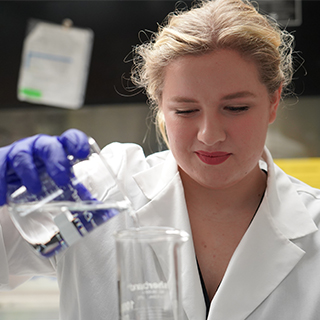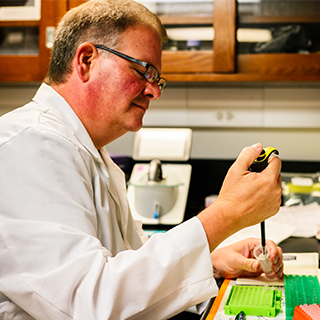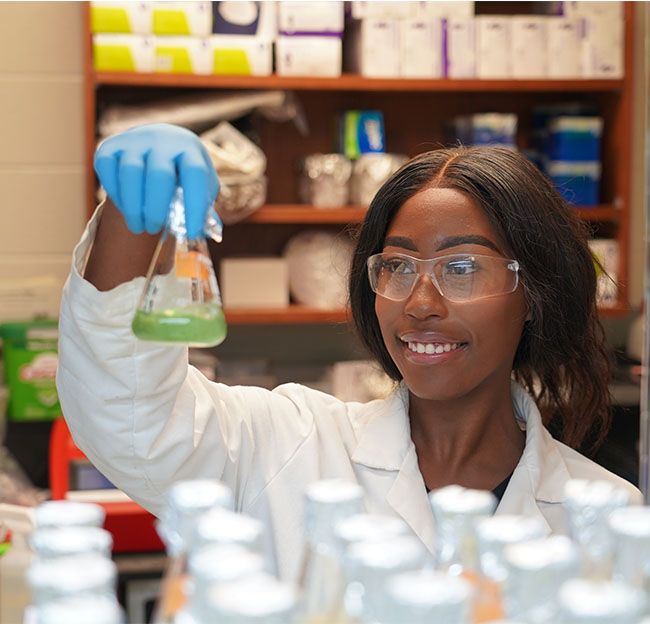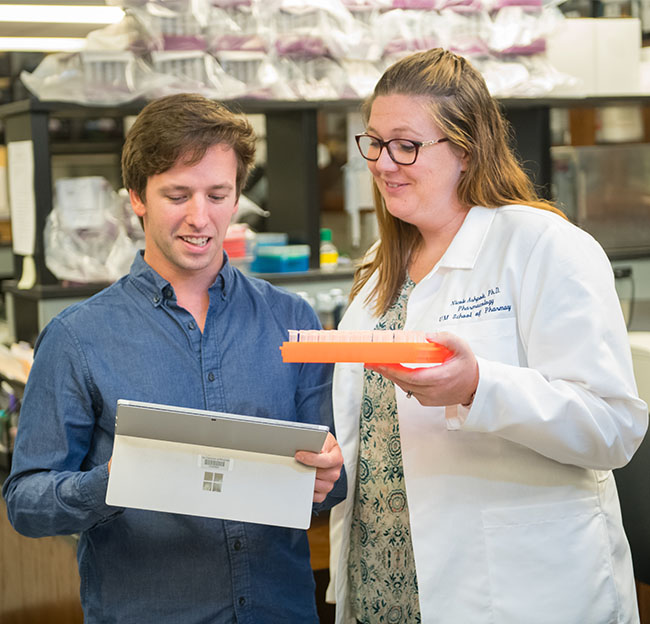BioMolecular Sciences Research
The University of Mississippi School of Pharmacy is globally recognized for its multidisciplinary research in discovering, developing, and translating innovative solutions to healthcare problems.
Research Areas
Dietary Supplements and Medical Cannabis
Through the research in this field you will be able to carve out your place in two in-demand industries to advance policy, research, and product design.

Environmental Toxicology
Participate in research and educational activities seeking to identify and resolve environmental and human health issues.

Medicinal Chemistry
In this interdisciplinary field of chemistry, biology, and pharmaceutical sciences, you will be involved in the development of new therapeutics for diseases.

Pharmacognosy
In this research are you will research the chemistry and pharmacology of bioactive natural products and their application in disease treatments.

Pharmacology
In this area research how chemical agents, including potential therapeutic candidates, act on biological systems.
Faculty's Research Expertise
David Colby
Medicinal chemistry; natural products; fluorine chemistry; synthetic organic chemistry; drug discovery in cancer; neurodegenerative disorders; addiction
Rachel Parmelee
Rachel earned her Master of Science in Nursing Education from Purdue Global and is currently working on her PhD dissertation in Nursing Education. Her dissertation is a hermeneutic phenomenological study exploring educators' experiences with knowing medical cannabis, relevant to the gap identified in her 2022 publication in the Journal of Nursing Regulation. Rachel’s expertise is in medical cannabis education for healthcare professionals.
Hayley Prescott
Dr. Prescott completed her B.S. in Herbal Sciences from Bastyr University and continued her graduate education at the University of Mississippi, receiving a PhD in Pharmaceutical Sciences with an emphasis in Pharmacognosy. Her dissertation work focused on "Botanical Aphrodisiacs for Women's Health." Dr. Prescott's expertise is in dietary supplements and herbal medicine.
Deb Gochfeld
Marine chemical ecology, ecology of marine diseases, and effects of anthropogenic and natural stressors on marine ecosystems, particularly coral reefs and oyster reefs.
John Rimoldi
Synthesis of pesticide and pollutant metabolites; LC-MS analysis; structure elucidation and Synthetic medicinal and natural product chemistry; plant-derived neurotoxins; anticancer drug development; core facility management; environmental chemistry
Courtney Roper
Our lab is dedicated to understanding the complex mixtures of air pollution using environmental chemistry and developmental toxicology techniques. Additionally, we are committed to community-engaged research, addressing locally identified environmental quality concerns, with a particular focus on the mid-South region.
Marc Slattery
Environmental stressor impacts on marine communities, particularly related to climate change. Effects of multiple vs single stressors on organismal-, population-, and community-level endpoints. Natural and anthropogenic gradient affects on phenotypes and genotypes. Drugs from the sea and the selective pressures that induce their biosynthesis.
Kristie Willet
Adverse outcome pathways of PAHs and cannabinoids; community-engaged participatory
research on lead in drinking water; environmental effects of coastal disasters;
epigenetic mechanisms of multigenerational toxicity using fish model
David Colby
Medicinal chemistry; natural products; fluorine chemistry; synthetic organic chemistry; drug discovery in cancer; neurodegenerative disorders; addiction
Robert Doerksen
The Doerksen research group focuses on applying the methods of computational medicinal chemistry to a wide variety of problems in rational drug design, including studies of the structure, interactions, reactions, and functions of molecules relevant to many human diseases, such as Alzheimer’s disease and malaria. We have a major emphasis on collaboration, with the goal of a team approach that is optimal for solving complex problems.
Jing Ling
The Li group focuses on deciphering the intricate relationships between sequence, structure, dynamics, and function in membrane proteins, particularly ion channels. Their research delves into the molecular mechanisms underlying protein dysfunctions that lead to diseases and employs computer-aided drug discovery to develop treatments for these conditions.
John Rimoldi
Synthesis of pesticide and pollutant metabolites; LC-MS analysis; structure elucidation and Synthetic medicinal and natural product chemistry; plant-derived neurotoxins; anticancer drug development; core facility management; environmental chemistry
Joshua Zhu
Dr. Zhu’s lab is interested in using organic chemistry and biochemistry tools to answer questions related to sugar in biological pathways and human diseases. Glycosylation (sugar modification) is a critical post-translational modification for human health. They use organic chemistry and biochemistry tools to take a close look at how sugars are involved in human health at the molecular level. Their current research focus is using synthetic chemistry to decipher the functions of glycosylation in the signaling pathways of immune cells.
Paul Boudreau
Understanding the structure of bacterial natural products is essential to elucidate their role in shaping bacterial communities and in harnessing those molecules as tools and therapeutics to improve human health and treat disease. Specific projects in the Boudreau lab include studying symbiosis between cyanobacteria and heterotrophic bacteria, exploring the biomineralization of toxic metals by bacteria, and probing the role of bacterial lipids in host immune regulation.
Ikhlas Khan
Medicinal plants and drug discovery; bio-guided fractionation; Quality and safety assessment of dietary supplements/traditional medicine; Analytical fingerprinting
Vitor Pomin
Structural characterization of biomedically active carbohydrates; NMR-based conformation and dynamics of functional oligosaccharides; carbohydrate-protein interactions of biomedical relevance; and medicinal screening of novel glycans.
Marc Slattery
Environmental stressor impacts on marine communities, particularly related to climate change. Effects of multiple vs single stressors on organismal-, population-, and community-level endpoints. Natural and anthropogenic gradient affects on phenotypes and genotypes. Drugs from the sea and the selective pressures that induce their biosynthesis.
Cole Stevens
Our group grows myxobacteria. Through the discovery of novel myxobacteria from the environment, our research questions and explores the utility provided by specialized metabolites to the producing organism. Using genetic information obtained from our collection of myxobacteria, we seek to 1) expand the synthetic biology toolbox for natural products discovery, 2) identify and characterize new natural product scaffolds, and 3) elucidate the mechanisms involved in horizontal gene transfer of biosynthetic gene clusters.
Brenton Laing
Neuronal circuitry of the hypothalamus and connected brain regions to control the regulation of fight-or-flight and feeding behaviors.
Gregg Roman
The Roman laboratory studies the molecular and neural mechanisms of behavioral plasticity. We are currently investigating ethanol tolerance and self-administration, olfactory learning, memory formation, and exploration and responses to novel stimuli. We use Drosophila melanogaster as our model system. The application of the large number of genetic tools available in Drosophila allows us to finely dissect the molecular events and the underlying neural circuits that drive the plasticity in these behaviors.
Joshua Sharp
Methods development for structural analysis of proteins and carbohydrates; biopharmaceutical higher-order structure analysis
James Stewart
The Stewart laboratory investigates the role of cardiac fibroblasts, AGE/RAGE signaling, and the extracellular matrix in type 2 diabetes mellitus-induced cardiomyopathy, as well as the impact of AGE/RAGE signaling on aging using RAGE knockout mice. Additionally, we are exploring the key drivers of brain aging related to cardiovascular pathologies and examining the effects of 2.5-micron particulate matter released from firearms on cardio-respiratory disease.
Noa Valcarcel
Scholarship of Teaching and Learning; Instructional Methods in Pharmacology and Other STEM fields; Language Barriers in Healthcare and Medical Spanish
Kristie Willet
Understanding the pharmacological and toxicological molecular mechanisms of action of cannabinoids, developmental origins of health and disease, and using aquatic animal models to study human disease.
-
ARE YOU READY to apply to graduate school?
Apply Here
Want to get involved in Summer Undergraduate Research?
The program aims to provide educational science research opportunities at the University of Mississippi to undergraduate students seeking research experiences and considering a career in research or academia. The program provides students with opportunities to learn about cutting-edge STEM-related topics, develop presentation and communication skills, practice networking skills, and explore and develop their interest in cutting-edge STEM-related research. In addition, the program aims to educate students beyond lab specifics and nurture students for successful careers in STEM, graduate, and/or professional programs.
Research Instrumentation
The specialized items of equipment shown below are housed within the Department of BioMolecular Sciences and are readily available for departmental graduate students and post-doctoral associates to utilize in the course of their research activities. The Department of BioMolecular Sciences at the University of Mississippi represents one of the most well-equipped, state-of-the-art biomolecular sciences departments in the USA. Although not exhaustive, below is a list of some of the technology we have at our disposal.
600 MHz NMR Spectrometer: Varian; 3mm inverse probe; variable temperature control (vtc) magic angle probe for the measurement of NMR data with micrograms of sample; water suppression and solid-state NMR
500 MHz NMR spectrometer: Agilient DD2; “OneNMR” probe for both high- and low-bands; equipped with Agilent 7620-AS autosampler with 96 sample capacity.
500 MHz NMR spectrometer: Agilient DD2; “OneNMR” probe for both high- and low-bands; equipped with Agilent 7620-AS autosampler with 96 sample capacity
500 MHz NMR spectrometer: Bruker Avance III HD; 5mm Prodigy CryoProbe400 MHz NMR spectrometer: Varian Mercury Plus; 3 mm broadband gradient probe; 50 sample changer
TWO – 400 MHz NMR spectrometer: Bruker Avance III HDTM; 5mm BBFO probe
400 MHz NMR spectrometer: Bruker Avance DRX; 3 mm dual probe; vtc.
400 MHz NMR spectrometer: Bruker Avance DRX; 3 mm inverse probe with a gradient; vtc.
Mississippi Center for Supercomputer Research (MCSR) currently has 3 supercomputers: Sequoia, Catalpa, and Maple.
1 – Microway Dual Intel Xeon WhisperStation 2.5 GHz 12-core workstation
1 – Microway WhisperStation 2.5 GHz Xeon 8-core workstations
3 – Microway WhisperStation Intel Xeon L5520 Nehalem 2.26 GHz 16-core workstations
3 – Microway WhisperStation Intel Xeon L5420 Harpertown 2.5 GHz 8-core workstations
3 – Linux workstations14- Windows computers
Molecular Modeling Software – Schrödinger, Gold, and MOE software suites
Campus licenses for CambridgeSoft ChemBioOffice and Gaussian.
(2) – Nikon Ti2-E motorized:
Inverted microscope with a Lambda DG-5 Ultra High-Speed Wavelength Switcher
HPLC-Mass Spectrometry
LC-MS Systems
(1) Waters Alliance HT LC/MS System consists of the Waters 2790 Separations Module, the Waters ZQ™ Mass Detector (Waters 996 Photodiode Array (PDA) Detector, and FractionLynx™ software.
(2) Waters Alliance LC/MS Systems consists of Waters ZQ Mass Detector, Photodiode Array Detector, and Alliance HPLC system.
HPLC Systems
Five (5) Waters Alliance HPLC Systems: (UV, Diode Array, Evaporative Light Scattering detectors).
Four (4) Waters DeltaPrep 4000 series HPLC Systems: Equipped with preparative capability – from hundreds of milligrams to grams per run, a PrepLC Controller, a solvent delivery unit, an integral injector panel, a Rheodyne 7725I injector, and Waters 996 Photodiode Array or Waters 2487 Dual Wavelength Absorbance Detector.
High-Resolution Mass Spectrometry
Thermo Orbitrap Fusion Tribrid LC/MS with multiple fragmentation modes, including collisionally induced disassociating (CID), higher-energy collisional dissociation (HCD), and electron transfer disassociation (ETD)
Dionex Ultimate 3000 UHPLC
Integrated autosampler/fraction collector and UV detector
Polarimeter
Rudolph Autopol IV, a six-wavelength polarimeter equipped with stainless steel jacketed cells, for measuring optical rotations. Volumes accommodated range from 1.0 mL to 0.05 mL.
Fourier Transform Infrared Spectrophotometer
Bruker Vector33 FTIR, with NIR and MID FTIR capabilities, is equipped with a fiber optics accessory for remote sensing and a HYPERION IRScope with ATR capabilities for solid-phase analysis of chemically modified resins.
UV-VIS Spectrophotometer
Hewlett-Packard 8453 Diode-Array Biochemical Analysis Spectrophotometer equipped with 7-cell thermostatted multicell transport accessory and dedicated water circulator. Biochemical Analysis software suite allows for kinetic analysis and real-time monitoring.
Elemental Analysis
Perkin-Elmer CHN/SO Series II Analyzer
Elemental analyzer equipped with a 60-sample carousel for performing high-throughput elemental analyses.
COMPex Pro 102 KrF
Excimer laser with a maximum output of 400 mJ/pulse at 248 nm
In Vitro Core
TopCount NXTTM Microplate Scintillation and Luminescence Counter
The In Vitro Core’s TopCount NXTTM analyzes six at a time and counts samples in 96- and 384-well microplates, as well as microcentrifuge tubes. The external plate stacker allows multiple assay plates for a high unattended counting capacity. The system automatically controls the counting chamber temperature to ensure a stable and reproducible counting environment. The TopCount NXTTM can be used for Cell proliferation, Receptor binding assay, Solid Phase RIA/LIA, Reporter gene assays, 51Cr release assays, HPLC fraction analysis, and Scintillation Proximity Assays (SPA).
UniFilter 96-well Harvester
The FilterMate Harvester is configured for harvesting UniFilter microplates with built-in GF/B® or GF/C® filters for analysis on the TopCount Microplate Scintillation and Luminescence Counters.
Tri-Carb 2900TR Liquid Scintillation Analyzer
The Tri-Carb 2900TR is a bench-top liquid scintillation analyzer used to measure small amounts of beta, gamma, and alpha radioactivity. The Tri-Carb features QuantaSmart instrument software.
Eppendorf epMotion® 5075
The epMotion machine is an automated pipetting system. It can dispense any quantity from 1-1000 μL in anywhere from 1-12 channels.
Perkin Elmer Envision® 2013 Multilabel Reader
This machine is a fast-reading detector HTS reader. It includes two detectors, which allow for simultaneous wavelength reading and reading below emission. It has stackers as well as internal temperature control for samples being loaded. It also has alpha screen capabilities and uses software to show plate readouts.
Thermo Scientific REVCO RB150 Incubator
This incubator is designed to retain CO2 levels internally for samples as well as keep them at a temperature. Systems are designed to also “trap” external water. It offers thermal protection and insulation as well as a spacious room for samples.
HERMLE LabNet Z323K Centrifuge
This high-performance centrifuge has high-speed rotors capable of producing up to 26,810 x g. Higher speed and g-force allow this centrifuge to be used in a biological lab setting. Parameters are set using easy turn knobs while their values are shown on large digital displays. Speed can be set and displayed in rpm or rcf. It has a radius-correction feature, and braking intensity can be set to ten different levels. There is also a refrigeration system internally, so heating or cooling can take place inside the centrifuge.
Spectrometer
Olis DSM 20 CD for measurements of circular dichroism (CD).
Other Research Centers and Cores
National Center for Natural Products Research
The National Center for Natural Products Research (NCNPR) is at the forefront of harnessing the power of nature, ensuring quality, safety, and driving innovation in natural product research and development.
Glycoscience Center of Research Excellence
GlyCORE supports investigators in glycoscience through direct funding of selected research projects, establishes mentors for early career investigators, supports the recruitment of new faculty in glycoscience, and develops local and regional meetings for investigators to discuss their work.
National Center for Cannabis Research and Education
Established in 2022, the National Center for Cannabis Research and Education (NCCRE) conducts evidence-based research on the health effects of cannabis and educates healthcare providers, policymakers and the public in order to shape the future of medical cannabis, improve patient care and inform public policy.
